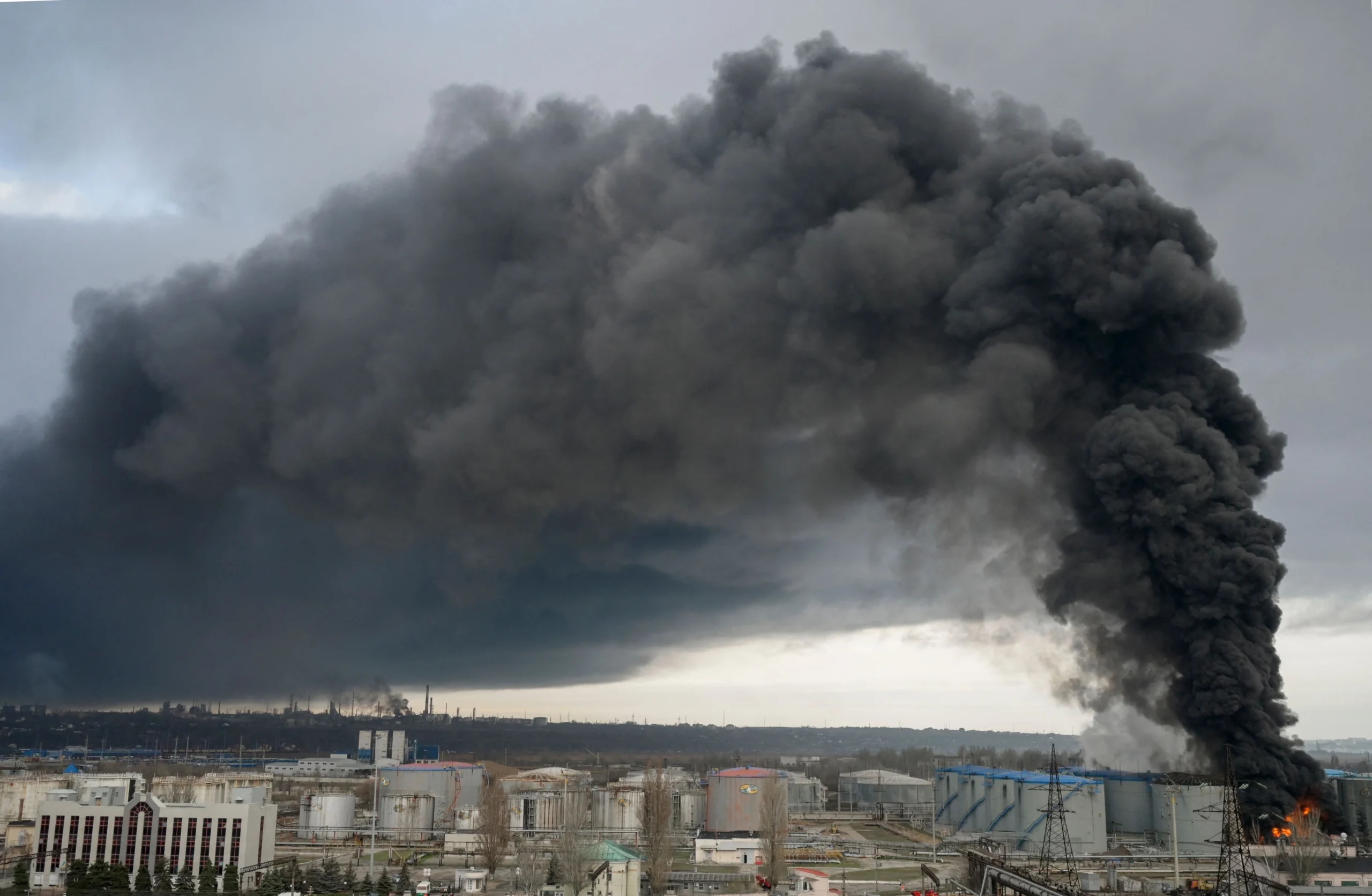The Price of War: Russia Faces €37 Billion ‘Conflict Carbon’ Bill as Ukraine Pushs for Climate Reparations

A New Dimension of War Reparations Emerges
As the world grapples with the consequences of Russia’s invasion of Ukraine, a new and unprecedented cost is being added to the ledger: climate reparations. Ukrainian authorities and international environmental economists have calculated that Russia’s military actions have generated tens of billions of euros in climate-related damage, introducing the concept of “conflict carbon”—greenhouse gas emissions caused directly by warfare.
The emerging estimate: €37 billion worth of climate damage stemming from Russia’s invasion.
This figure is not simply symbolic. It reflects a growing global movement to hold aggressor states financially accountable for the environmental and climate impacts of war—a domain long overlooked in traditional post-conflict reparations.
What Is ‘Conflict Carbon’?
“Conflict carbon” refers to the greenhouse gases emitted during military operations, including:
- fuel consumption by tanks, jets, ships, and vehicles
- destruction of industrial facilities
- burning of oil depots, warehouses, and infrastructure
- forest fires and agricultural destruction caused by shelling
- methane leaks and chemical spills from damaged pipelines
- reconstruction emissions needed to rebuild destroyed cities
Unlike peacetime emissions, conflict-related emissions are unplanned, uncontrollable, and massively carbon-intensive in short bursts.
The invasion of Ukraine represents the largest single conflict-related emissions event in Europe since World War II.
How the €37 Billion Figure Was Calculated
Environmental auditors and climate economists worked with Ukrainian ministries to quantify:
1. Direct military emissions
Including fuel burned by aircraft, drones, tanks, armored vehicles, trucks, and naval assets.
2. Indirect emissions from destruction
When infrastructure burns or collapses, massive amounts of carbon are released.
Examples include:
- oil refineries
- gas pipelines
- chemical plants
- power stations
- city-wide fires
3. Ecosystem destruction
The war has caused:
- forest loss
- soil carbon release
- contamination of wetlands
- agricultural field burnings
Nature’s ability to absorb carbon has been weakened.
4. Reconstruction emissions
Rebuilding cities, housing, steel production, cement manufacturing, and logistics will produce future emissions that Ukraine argues should also be counted as climate damage caused by Russia.
5. Long-term environmental degradation
Polluted land and water will require years of remediation, adding to the long-tail carbon footprint.
Combined, these categories produce the projected €37 billion climate-reparation claim.
Why This Claim Is Historically Significant
The concept of climate reparations for war is largely uncharted territory. Traditionally, war reparations have covered:
- infrastructure damage
- economic loss
- human casualties
- cultural heritage destruction
- displacement and refugee support
Environmental losses were considered secondary.
Ukraine is now pioneering a new legal category:
War-driven climate damage as a billable offense.
If successful, this could transform international law and future conflict accountability.
The Environmental Toll of the War: A Deep Dive
1. Massive fuel consumption by military forces
Armies are extremely carbon-intensive.
A single fighter jet sortie can burn thousands of liters of fuel.
Thousands of such operations have occurred.
2. Destruction of industrial sites
Explosions, fires, and toxic leaks have released:
- CO₂
- methane
- refrigerants
- chemical gases
- particulate pollution
These emissions dwarf those of many small countries.
3. Forest and farmland destruction
The war has torched millions of hectares of land, releasing carbon stored in vegetation and topsoil.
4. Energy infrastructure sabotage
Attacks on power grids, pipelines, and depots have created huge combustion events.
5. Marine and river pollution
Damage to ports and river ecosystems further reduces natural carbon absorption capacities.
Ukraine’s Argument: ‘Polluter Must Pay—even in War’
Kyiv’s position is straightforward:
- Russia caused the emissions.
- Ukraine did not choose or benefit from them.
- The climate damage will affect generations.
- Therefore, Russia should pay.
Ukraine wants this liability recognized under:
- international environmental conventions
- war reparations frameworks
- carbon pricing models
- potential UN mechanisms for environmental damage in conflict
This marks a paradigm shift in post-war accountability.
How Russia Responds—and What Happens Next
Russia rejects all forms of war reparations, including environmental ones, arguing:
- international courts lack authority
- carbon-accounting in war is speculative
- Ukraine is using climate claims as a political weapon
But the global legal landscape is changing:
- International courts are now hearing climate-related cases.
- Countries have added environmental destruction to war-crimes frameworks.
- The EU is building legal channels to seize frozen Russian assets.
- Carbon pricing is becoming standard in international finance.
Even if Russia never voluntarily pays, compensation could be extracted from frozen Russian sovereign assets, an idea supported by multiple Western governments.
Europe’s Role: Why the EU Supports Climate Damage Accounting
The European Union is backing Ukraine’s climate-damage claims for several reasons:
1. Precedent-setting for global conflict accountability
A mechanism created for Ukraine could apply to:
- future conflicts
- environmental damage caused by occupying armies
- geopolitical aggressions involving pipelines or infrastructure
2. Aligning war reparations with climate policy
Europe has carbon pricing, carbon budgets, and strict emissions accounting.
War cannot be allowed to bypass these systems.
3. Reinforcing Russia’s financial isolation
Environmental reparations add a new layer of long-term cost.
4. Protecting Europe’s climate goals
Conflict-driven emissions undermine EU climate progress and must be compensated.
The Bigger Picture: Why ‘Conflict Carbon’ Could Reshape Global Policy
If Ukraine succeeds, several global shifts may occur:
A. Environmental damage becomes part of war-crimes frameworks
Military commanders could be held liable for:
- burning oil fields
- destroying chemical plants
- poisoning rivers
- triggering long-term climate emissions
B. Nations may calculate wartime emissions in future conflicts
This would add:
- financial penalties
- reputational costs
- political consequences
C. Climate reparations could become an international norm
Especially as conflicts increasingly intersect with:
- energy resources
- pipelines
- critical minerals
- water scarcity
- environmental sabotage
D. Carbon markets may integrate conflict emissions
Leading to direct financial liabilities for aggressor states.
Conclusion: A New Era of Climate Accountability in War
The proposed €37 billion “conflict carbon” bill is not only about monetary compensation. It represents a turning point in how the modern world evaluates war.
War is no longer judged solely by:
- human casualties
- territorial losses
- damaged infrastructure
It is now also judged by its climate impact.
Ukraine’s push for climate reparations challenges the global community to consider a profound question:
If climate change is the greatest long-term threat to humanity, should the carbon footprint of war be treated as one of its gravest crimes?
The answer could redefine international law, reshape global conflict accountability, and set powerful new precedents for the environmental cost of aggression in the 21st century.


















